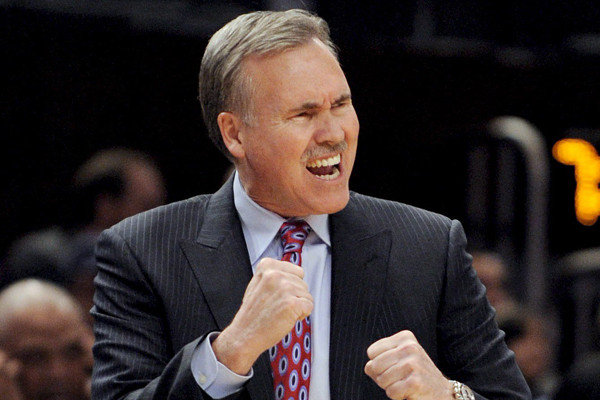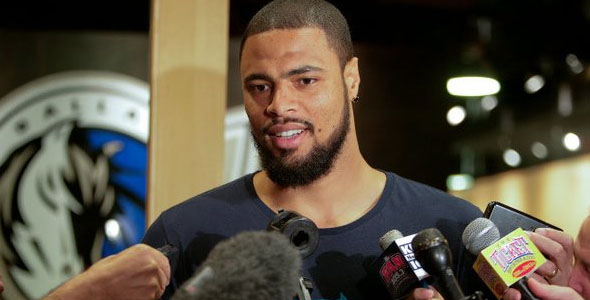Mike D’Antoni has so often been cited as an overrated coach, he’s become an underrated coach.
The word “coach” is used loosely here, because D’Antoni isn’t one at the moment, not since 2013-14, when he guided a makeshift version of the Los Angeles Lakers to a 27-55 record. Even then, when he could still be found on NBA sidelines, he was considered overrated, a head honcho who preached pace and space and could drum up the stat lines of any point guard, but who couldn’t coach defense or truly develop players or guide a championship-level team.
I’m here to call bullshit on that take, that oh-so-popular, though not-currently-relevant assumption. And I’m not doing this randomly. No, no, no. Something David Lee said about the Boston Celtics offense under the widely revered head coach Brad Stevens got me once again thinking about this.
Here’s Lee’s comment, per Jay King of Mass Live:
David Lee noted that the Celtics offense is like the Mike D'Antoni system in New York. Everyone has stolen from that.
— Jay King (@ByJayKing) October 22, 2015
This isn’t the first time D’Antoni has received credit, indirectly or otherwise, for his offensive ideology. His mid-2000s Phoenix Suns teams changed the way franchises approached and built offenses, and it changed the way we judged them. Small ball, pace-and-space, three-pointers, few mid-range jumpers—all of these things, these rules, were to some degree tethered to D’Antoni’s offensive philosophy.
Last season, Golden State Warriors coach Steve Kerr, the primary architect of a jump-shooting team, of a D’Antoni-type team, that would go on to win an NBA championship, credited Magic Mike, among others, for shaping the way he coached his players:
Steve Kerr credits Mike D'Antoni, Gregg Popovich & Erik Spoelstra for creating the better brand of offensive basketball in league now.
— Ethan J. Skolnick (@EthanJSkolnick) February 6, 2015
Kerr did the same thing even after the Warriors were crowned champions, once again citing the importance of Steve Nash’s role within D’Antoni’s system and how that inspired him once he reached the sidelines, per Kurt Helin of ProBasketballTalk:
“I think Steve kind of laid out a vision for a whole generation of young point guards. And with the game changing, Mike D’Antoni kind of initiating that style in Phoenix, the floor starting to spread, the whole league kind of playing shooting fours and fives and playing a little faster. I think Mike and Steve in many ways set the table for Steph Curry. And I think Steph would tell you that too. He has great respect for Steve.”
There’s no need to go into detail about those Suns teams. You know about them, and how good they were offensively. Statistically, they deployed some of the best offenses ever, not just of their era. That’s a mathematical fact.
This is more about D’Antoni now, and his glaring absence from the sidelines. It’s unclear whether it’s by choice or not at the moment. He has been linked to jobs in the past, most recently the Denver Nuggets’ vacancy this past summer, but nothing has truly materialized. Granted, it hasn’t been too long since his last gig, and he has been around, providing some tips on NBA TV, but it still feels weird. The NBA as it is today is one he helped build, and yet it’s also one of which he isn’t a part.
Is that purely because of perceived shortcomings as a defensive coach? Or because of how bad his New York Knicks and Lakers teams were? Maybe, but teams are smarter than that today. You hire a defensive specialist to coach alongside D’Antoni. That’s what the Knicks did in 2011-12 with Mike Woodson, and they ended up ranking inside the top five of defensive efficiency, per Basketball-Reference.
Besides, it’s not like D’Antoni’s Suns, Knicks and Lakers teams can be a total referendum on his defensive abilities. He never really had excellent defensive talent, save for his latter years with the Knicks. Give him more defensive-oriented players, and perhaps he would field a better defense.
Back then, during his Suns and Knicks days, the problem was likely that the talent his system demanded didn’t include players who could play both ends of the floor. Now, with his style becoming commonplace, you have the Anthony Davises, the Karl-Anthony Townses, the Kristaps Porzingises, the Serge Ibakas—bigs who, at their peak, are able to space the floor and play defense.
As for his disastrous time with the Lakers, well, D’Antoni was never given enough of a chance to succeed. The superteam of 2012-13 was an amalgam of uncontrollably insatiable egos, and Dwight Howard, as has been his M.O. over the years, never truly bought into his role as a pick-and-roll-only center. And in 2013-14, that team was just awful. It was meant to lose; it was meant to be that stopgap as the Lakers conserved cap space.
No, D’Antoni isn’t the perfect coach, and to some extent, his past failures—like parts of his relationship with Carmelo Anthony in New York—fall on him. But no matter how you view his coaching track record, one that has spanned nearly 900 regular-season tilts, there’s no denying the bizarreness of D’Antoni ostensibly moving further and further away from the NBA at a time when it’s made for him.




















